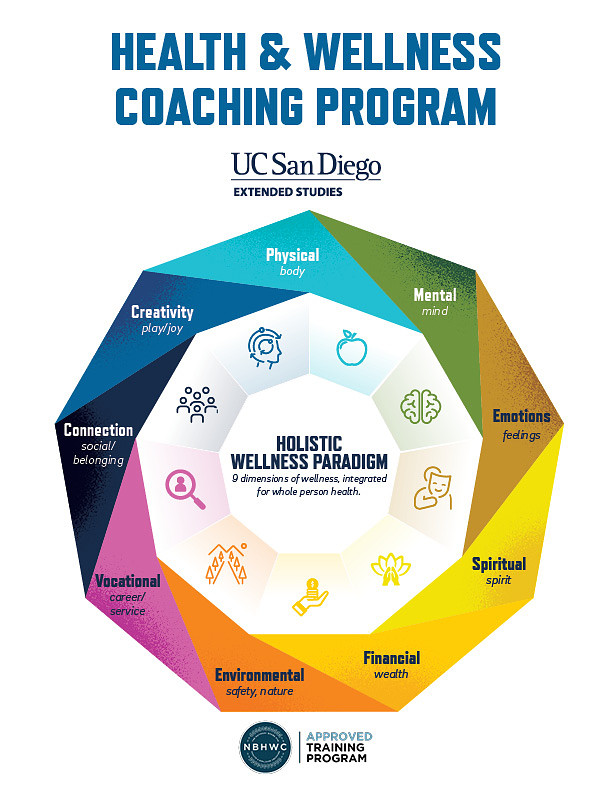
17 October 2024
How to Become a Health and Wellness Coach
Is health and wellness coaching the career for you? Here’s what you need to know.
Many of us strive for better health and wellness in our lives, yet we often fall short of our goals. The daily grind of managing work, family, and other obligations can leave us feeling drained. Even when we want to prioritize it, making lasting changes often requires more than just a few minutes with a busy doctor or the occasional workout plan.
This is where a health and wellness coach steps in.
“Health and wellness coaches are really wonderful bridges between doctors, allied health professionals, and the individuals,” said Dr. Natiya Guin, a naturopathic doctor and certified health and wellness coach who is one of the principal instructors in the UC San Diego Division of Extended Studies Health and Wellness Coaching Specialized Certificate program.

Health and wellness coaches specialize in providing personalized ongoing support that empowers people to achieve lifestyle changes they’ve been struggling to make on their own.
For people who are passionate about health and wellness and would like to make a living helping others improve this aspect of their lives, a career as a health and wellness coach can be an interesting and fulfilling option to consider.
“Being a health and wellness coach allows me to connect with my clients on a deeper level,” shared Dr Guin. “I get to spend more time with them, really listen to their needs, and help them achieve their goals. It’s a rewarding career, and I’m excited to help others get started on this path.”
We asked Dr. Guin to share more with us about what it means to be a health and wellness coach, what the career and earning prospects are, and what to expect from UC San Diego's Health and Wellness Coaching Certificate program.
What is a Health and Wellness Coach?
The role of a health and wellness coach is to help clients take charge of their health by guiding them to make lasting, positive changes that improve their overall well-being.
This can include everything from improving sleep, reducing stress, and managing weight to increasing energy levels, improving relationships, or having more fun.
"A health and wellness coach’s goal is to find out what the client wants to work on in their body, mind, or overall wellbeing, and help them make changes in their life to achieve those goals," explained Dr. Guin.
Most of the work happens in the form of motivational interviewing to help clients identify and establish desired outcomes. This process may include unearthing mental, emotional, and practical blocks that are holding someone back from realizing their goals.
From there the coach and client work together to set achievable short-term goals and a sustainable action plan to ultimately reach long-term goals. This consistent support helps clients make sustainable lifestyle changes that can enhance their well-being into the future.
“We give recommendations, but we don’t tell clients what to do. We empower them to take charge of their own health,” says Dr. Guin.
The 9 Dimensions of Wellness: An Integrated Approach to Health
At the core of health and wellness coaching is the wellness paradigm. This paradigm recognizes how each of the nine dimensions of wellness—including physical health, mental health,, emotional resilience, spiritual well-being, financial wealth, environmental safeness, career satisfaction, social relationships, and even the individual's creativity-–are all interconnected.
For this reason, solutions might require investigating more than just the obvious aspects of a person’s life. Similarly, challenges in one area of life can spill into another.

“You might have someone who’s struggling with stress at work, and that’s impacting their physical health. Or someone may feel out of shape, and it’s affecting their emotional connection with a partner,” says Dr. Guin. “We work in every area of life to ensure clients are addressing the root causes, not just the symptoms.”
Wellness coaches help clients identify these highly personalized patterns and work with the clients to explore realistic and sustainable practices that help clients make improvements.
"Oftentimes clients know they want to feel better, but they don’t know exactly what’s wrong,” said Dr. Guin. “We help them figure out what changes they need to make, and an action plan to see it through."
Health and Wellness Coach Certification
While having a background in medicine or fitness can be helpful, it’s not a requirement to become a health and wellness coach.
“We train people from all backgrounds,” says Dr. Guin. “This program is designed to give students all the tools they need to succeed, regardless of their prior experience.”
Programs like UC San Diego’s Health and Wellness Coaching Certificate program prepare students to pass the National Board for Health & Wellness Coaching (NBHWC) exam, which is the industry standard for coaching excellence.
This national health coach certification provides credibility and opens the doors for more opportunities.
“Once students complete the program, they’re eligible to take the NBHWC exam and become nationally certified. This means you can work with clients all over the country, either in person or through telemedicine,” says Dr. Guin. “This certification is often a requirement for any organization that would hire a health and wellness coach, too.”
What Career Opportunities Can You Expect as a Health and Wellness Coach?
Health and wellness coaches have a wide range of career opportunities.
Many coaches work with clients in private practice, while others are employed by corporate wellness programs, gyms, or wellness centers.
For those with an entrepreneurial mindset, the opportunities are vast. Coaches can design their own programs, write books, or host online courses, workshops, and wellness retreats.
“Many coaches are drawn to this field because of the entrepreneurial potential,” said Dr. Guin. “Coaches can work independently, set their own hours, and even create online programs. This career offers a great deal of freedom.”
Remote coaching and national accreditation also allow for location independence, giving coaches the freedom to live, work, and accept clients from anywhere in the country.
The ability to specialize in areas such as stress management, nutrition, or mental health allows coaches to carve out their own niche.
Is Health and Wellness Coaching Right for You?
Health and wellness coaching is a fulfilling and flexible career that offers the opportunity to make a real impact on people’s lives.
Whether you’re a healthcare professional looking to expand your skills or someone ready for a career change, becoming a certified health and wellness coach can open doors to new possibilities.
Explore the Health and Wellness Coaching Specialized Certificate at UC San Diego Extended Studies and take the first step toward a rewarding future in health and wellness coaching. If you have any questions about the program, please use the Request Information button on the site to get connected.